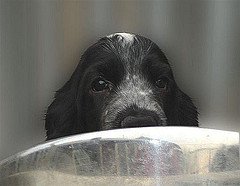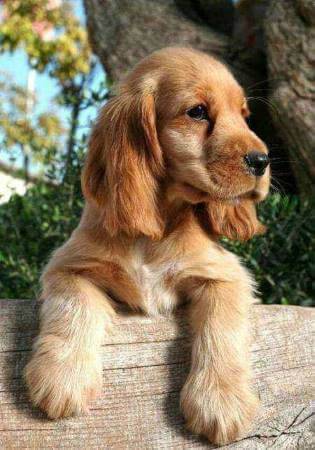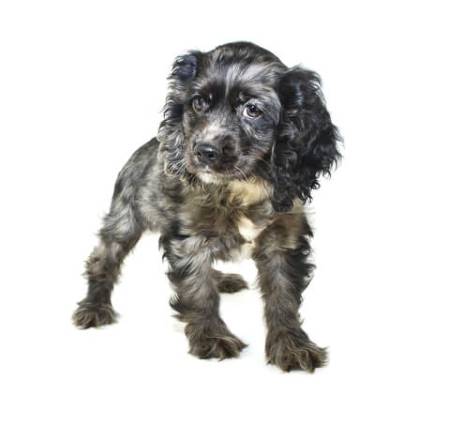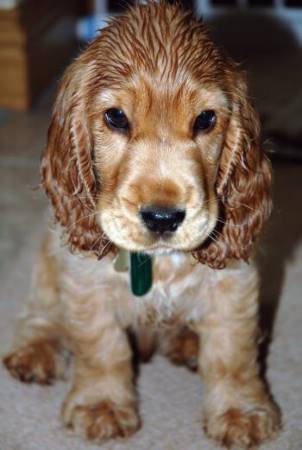- Home
- Getting A New Puppy
- How to find a breeder
How To Find A Breeder
You're here because you want to know how to find a breeder, not just any breeder; you're searching for reputable Cocker Spaniel breeders.
These great tips on how to find a breeder and, more importantly, how to weed out unscrupulous breeders (like puppy farmers) will help you to find professional responsible Cocker Spaniel breeders.
Getting your puppy from a professional breeder will ensure you have a healthy, well-bred Cocker Spaniel puppy. What's not to like?
How To Find A Breeder With Healthy, Well-Bred Puppies
Congratulations, you've decided to plump for a Cocker Spaniel puppy!
But before you get caught up in all that excitement, please don't choose the first cute-looking puppy you see in the pet shop or a local newspaper advert, for example.

No professional breeder would give their puppies to a pet shop. NEVER!
It is essential you choose your breeder first. Why?
By finding a good breeder, it's a given that your puppy will be healthy and well-bred with parents that have been DNA tested.
The breeder will have already begun socialising their puppies to help them become confident and happy with everyday situations.
In short, your puppy will have had the best possible start in life!
How To Find A Breeder: Professional Versus Hobby Breeder?
There are two types of breeders; a professional breeder and a hobby breeder.
Do you know the difference?
Below, I explain the differences between the two to help you decide which type of breeder you will use.
Professional Cocker Spaniel Breeders
A professional breeder will breed and rear Cocker Spaniel puppies as their primary business focus. They are likely to produce puppies from several Cocker females at any time.
If you decide to use a professional Cocker Spaniel breeder, choose one who only breeds Cocker Spaniels, carries out health checks on their breeding pair, and who also breeds on temperament.
They may or may not have their own stud dogs, but their choice of stud dog will have been chosen very carefully.
There may well be many young puppies at any one time. They usually have too many to be reared in the family home, so they're often bred in kennels on their premises.
Most professional breeders' kennels will be immaculately clean and spacious, with small outside runs, and their puppies will be loved and well-cared for.
The pups will be checked by the vet and wormed and vaccinated; their puppies' health and happiness will be paramount.
Top Tip: Remember to ask the breeder for details of any socialisation they've done so far!
The downside (if there is one) to puppies being reared in kennels is that they could be slightly under-socialised, meaning the puppies may have had less human contact than they would have if they'd been raised in the family home.
However, a good breeder will try to compensate for this and put extra effort into socialising their puppies so that when you bring your new puppy home, he'll be ready to fit into his new 'human world'.
'Hobby' Cocker Spaniel Breeders
The hobby breeder typically has two or three pedigree females living in the home as domestic pets.
Some hobby breeders may not be quite as knowledgeable or have as much experience as a professional cocker spaniel breeder.
Most hobbyists become breeders purely for the love of their dogs and the breed itself.
It should be noted, though, that most hobby breeders are very professional in their approach to breeding; they're incredibly knowledgeable and take the breeding process very seriously.
 Good cocker spaniel breeders sell puppies like me!
Good cocker spaniel breeders sell puppies like me!Like the professionals, hobby breeders are often very particular about who they let their puppies go to (after all, they're giving away their 'babies'!) and will vet a prospective buyer very closely.
Their puppies are often raised in the home with the rest of the family, which means the pups will be socialised well.
When dealing with a hobby breeder, it's always good to ask how many litters they've bred to give you an idea of their experience.
The Kennel Club guidelines state that the bitch must be over one year old when mated, have no more than 4 litters in her lifetime, and certainly no more puppies after she's 8 years old.
Both professional breeders and experienced hobby breeders will be very helpful and offer you lots of advice about caring for your puppy before and after taking your tiny bundle home.
Delphmount Cockers: Our breeder was fantastic! She was very professional and so knowledgeable about Cocker Spaniels. She was enthusiastic about her puppies and dogs, and couldn't have been more helpful.
Anita's details are: Anita Rothwell, 20 Bornaskitaig Kilmuir (Trotternish Ridge) , Isle of Skye IV51 9YS (delphmountcockers@gmail.com).
How To Find A Breeder: Best Questions To Ask A Breeder
Okay, so you've done your research, and you're holding a shortlist of excellent Cocker Spaniel breeders in your mitt. It's time to telephone one of them and ask for further details about themselves and their puppies.
It's essential to show your breeder that you're knowledgeable about Cockers and have done at least a little research.
You'll need to convince them that you'll make a responsible owner and can give one of their puppies a loving home. They will be really fussy about who they give their babies to, and who can blame them?
The tips and advice given here will give you an idea of informed questions to ask Cocker Spaniel Breeders and help you get to know and understand them better.
Best of all, it will ensure you find a breeder to suit you!
Where To Find Your Cocker Spaniel Breeder
My first port of call would be the Kennel Club. You can search for Kennel Club Assured Breeders by breed, location and distance from you.
Word of mouth is also a good source of Cocker Spaniel breeders, but if that's not forthcoming, you could try searching online for a general list of local breeders.
This list won't guarantee they will be reputable; however, you now have tools to work out whether they are puppy farmers, good breeders, hobbyists or otherwise!
How To Find A Breeder: Other Sources For Cocker Puppies
Alternatives are available if you are still looking for a breeder near you and are not prepared to travel.
Dog Shows and Clubs:
You could visit local dog shows or contact the Cocker Spaniel Club for details of local breeders with Cocker Spaniel puppies for sale.
 My Mummy says I'm special!
My Mummy says I'm special!Your Local Vet:
Your local vets' practice is also a good source for puppies because they can often put you in touch with good Cocker Spaniel breeders.
Kennel Clubs:
If you've already searched locally and have yet to find anything near you, the UK Kennel Club or the American Kennel Club may still be able to help you.
You'll need to widen your search and be prepared to travel further afield to find the right breeder for you.
Where NOT To Buy Your Cocker Spaniel Puppy?
Puppy Farms & Puppy Mills
Whatever you do, please, please, don't buy your puppy from a puppy farm!
Puppy farms (also known as puppy mills) are where puppies are bred purely for profit. Standards are low, and the welfare of the puppies and dogs is secondary.
No matter how sorry you feel for these puppies (and believe me, I understand how hard that will be), please be strong and walk away.
If you buy a puppy from a puppy mill, you may save one puppy, but you will keep a puppy farmer in business in the longer term!
Learn more about puppy farms and why you should avoid them.
Please Don't Buy From A Pet Shop!
I would never recommend you buy a puppy from a pet shop either, simply because the chances are that they've sourced their puppies from a puppy farm!
How To Find Reputable Cocker Spaniel Breeders: Summary
Look for a responsible breeder before choosing a puppy; first, choose your breeder, then select your puppy.
Decide whether you're going to use a professional or a hobby breeder.
 That was my first bath, it was great!
That was my first bath, it was great!Remember that no matter which you choose, you will still need to do a little research about the breeder you choose. You must be sure you're dealing with a reliable breeder rather than a puppy farmer.
Don't buy from pet shops; you can never know where these puppies originated. Usually, they come from puppy farms.
In addition, ask as many questions as you can.
If they are a responsible breeder, they'll welcome your questions. In fact, they'll expect lots of questions from you about themselves, their dogs and their puppies. Your questions will confirm to them that you really care.
Whatever you decide, I wish you lots of luck!
Photo credits for How To Find A Breeder:
1. Inanna at Flikr.com https://www.flickr.com/photos/68706446@N00/158132450
2. SensorSpot at https://www.istockphoto.com/stock-photo-2174793-cocker.php?st=4e7bb18
3. Jaime Staley-sickafoose at https://www.dreamstime.com/royalty-free-stock-images-cocker-spaniel-puppy-image21342469
4. Web author's own photograph


